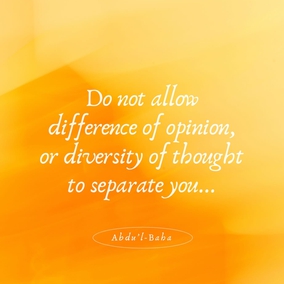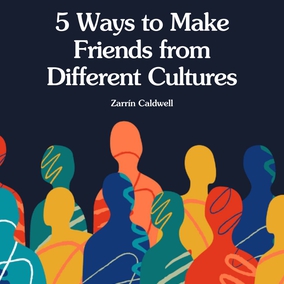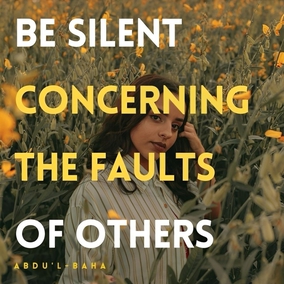The views expressed in our content reflect individual perspectives and do not represent the authoritative views of the Baha'i Faith.
O SON OF SPIRIT! My first counsel is this: Possess a pure, kindly and radiant heart, that thine may be a sovereignty ancient, imperishable and everlasting. – Baha’u’llah, The Hidden Words, p. 3.
As we undertake our exploration into The Hidden Words, you might want to know a few basic facts about the book. To begin to understand the beautiful, mystical passages of Baha’u’llah’s book, readers often find a little background information helpful.
Baha’u’llah wrote this 50-page book in 1858, while walking along the Tigris River, where historians say civilization first flowered and the Bible says the prophet Daniel had his revelatory vision. Written in two sections in different languages, the Arabic portion of the book tends toward straightforward, succinct spiritual counsel for humanity; while the Persian language section tends more toward longer, mystical and more symbolic lyrical passages.
The English translation of Baha’u’llah’s book came out in 1932. The language of the translation has an elevated, almost Biblical cadence and tone – because Baha’u’llah wrote The Hidden Words in the exalted, formal and highly poetic style of the original Persian and Arabic. Those majestic writings, intended to transmit the voice, values and virtues of God to humanity, can’t accurately be rendered in standard, colloquial English usage. Even though modern readers who don’t usually read scriptures or holy books may be unfamiliar with them, the English version of the Hidden Words has some seemingly archaic expressions like Thee or Thine – intended to represent and reproduce the lofty, noble intentions of the original.
Each of the Hidden Words begins with an invocation and an exclamation – “O Son of Spirit!; O Son of Man!; O Dwellers in the City of Love!, O Son of Being!” These evocative, honorific invocations address the reader nobly and enthusiastically from the perspective of the Creator, calling on each of us to listen carefully and consider deeply.
(One caution: the Baha’i writings make clear that the words “son” and “man”, used repeatedly in the invocations, definitely do not indicate only the male gender. Baha’u’llah addresses the entirety of humanity in the Hidden Words, and these collective nouns used in the opening invocations don’t translate well from the original languages. Instead they represent all of us, with no differentiation between men and women.)
This very first Hidden Word, and one of the most well-known, calls on each of us to “possess a pure, kindly and radiant heart.”
The Baha’i teachings say the human heart – that seat of emotion, love, spirituality and hope – belongs to God, our Creator and Fashioner. Here, speaking of God’s love for humanity, Baha’u’llah makes it clear:
He hath chosen out of the whole world the hearts of His servants, and made them each a seat for the revelation of His glory. – Gleanings from the Writings of Baha’u’llah, p. 296.
So what does Baha’u’llah mean when he asks us to possess a pure, kindly and radiant heart? Perhaps one of the ways to understand this profound passage involves thinking about striving to develop and attain the spiritual virtues, the heavenly attributes our inherent human nobility calls us towards. To do that, you can ask yourself some deceptively simple questions.
Do I want a pure heart? Would I like my kindness to radiate out to others? Or would I like a cynical heart? Do I have a desire to be unkind, even mean or hateful?
Almost everyone wants to develop the qualities and virtues Baha’u’llah calls for in this Hidden Word – purity, kindliness, radiance. Our hearts yearn for the spiritual maturity and the individual psychological health those qualities describe. This yearning, researchers have found, occurs naturally for almost all people. We want to have pure, kindly and radiant hearts – maybe because we know people with those qualities, and we love, honor and want to be near them.
And if we develop those qualities, those refined, attractive spiritual attributes, Baha’u’llah tells us, ours will “be a sovereignty ancient, imperishable and everlasting.”
In other words, we each have the key to our own immortality. Baha’u’llah makes us an implicit promise here, assuring each person that working to develop our spiritual character, growing our best and most evolved traits and qualities, will make our souls imperishable and everlasting.
But back to those simple questions – sure, most of us want to have pure, kindly and radiant hearts. Sadly, we don’t always feel pure, kindly or radiant. Sometimes we each feel cynical and unkind, and who doesn’t harbor a little hatred in their heart? We’re human, after all.
That central human dilemma – wanting to achieve purity and kindness but not always feeling very pure or kind – shapes the path of our lives and defines the struggle of existence.
Please follow along in this series on the Hidden Words as we explore what Baha’u’llah has to say about that struggle and how to overcome it.
Download the free The Hidden Words eBook.

















Comments
Sign in or create an account
Continue with Googleor